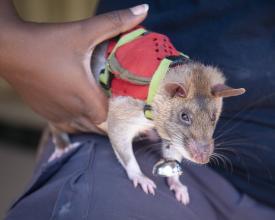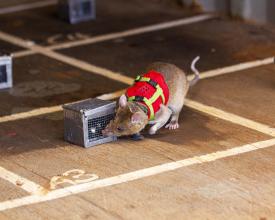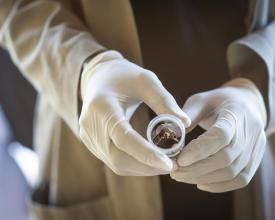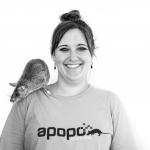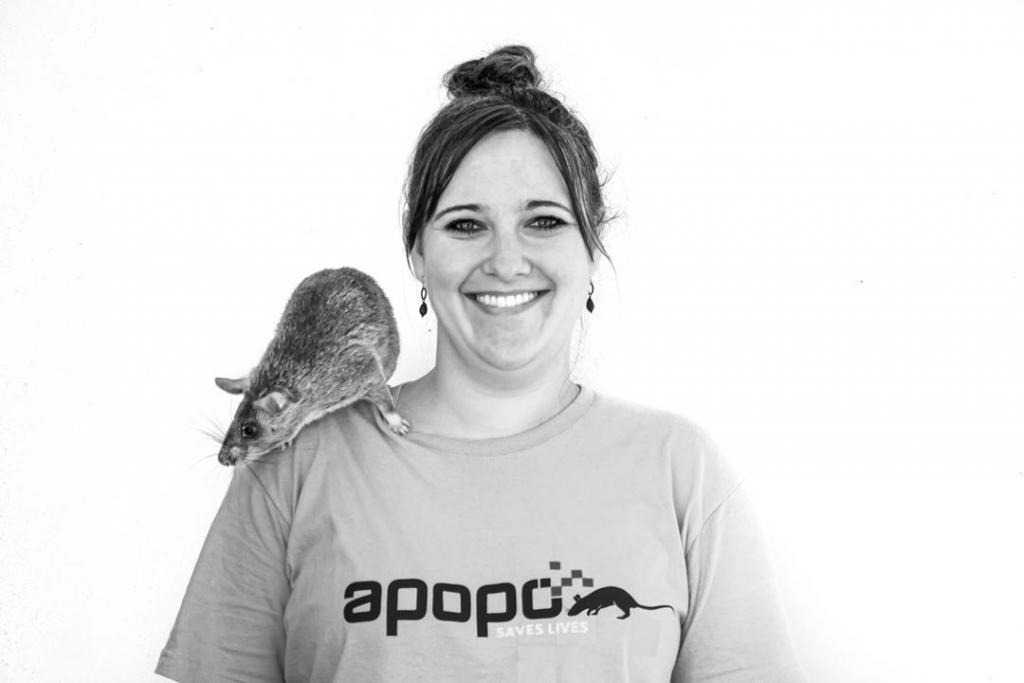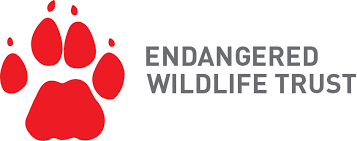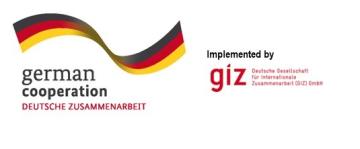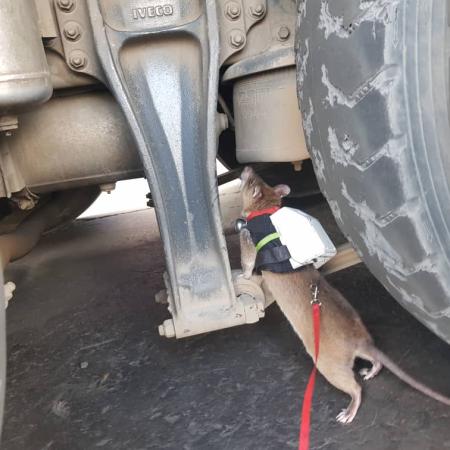
Training African giant pouched rats to detect illegally trafficked wildlife
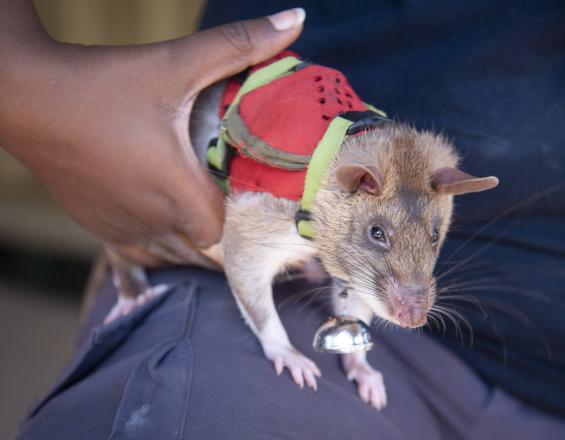
APOPO, a Belgian NGO headquartered in Morogoro, Tanzania, trains African giant pouched rats, Cricetomys ansorgei, for scent detection purposes. Over the past 25 years, APOPO has successfully deployed rats in former conflict zones to use their incredible sense of smell for the detection of landmines and other explosives. In addition, these 'HeroRATs' also help detect tuberculosis in patient samples. Building on this knowledge, our solution is to train HeroRATs to detect illegally trafficked wildlife in shipping containers and other applicable environments.
Context
Challenges addressed
Cost-efficient methods and solutions are required to address challenges such as landmines and tuberculosis, which often occur in Global South countries where financial resources are limited. Deploying scent detection rats offers such a solution. Further, compared to scent detection dogs, rats readily work with any skilled handler, are more cost-efficient to house and maintain, and have a similar working life span.
Similarly, rats address a range of challenges such as being able to navigate smaller spaces than dogs, being native to tropical climates, and having fewer cultural restrictions when being handled closely by humans. Our HeroRATs also address economic challenges in ports where the screening of goods must be cost-efficient and rapid as well as for countries whose economies are affected by the illegal wildlife trade through loss of their natural heritage. In addition, such trade is closely linked to the trafficking of humans, weapons, and drugs.
Location
Process
Summary of the process
APOPO, building on 25 years of experience, develops and implements rat training plans. These not only optimize rat performance and results, but also prepare rat trainers for deployment in operational settings.
Internally accredited rats and their handlers are then deployed at applicable sites, which is substantially supported by our partners.
Funding partners support rat training, development of new programs, and running costs along with operational deployment. Often, separate parts of this process are covered by separate funding sources. The same applies for supporting partners. For example, wildlife detection rat training has been funded by a wide range of donors over the years, whilst the Sokoine University of Agriculture and Tanzanian Wildlife Management Authority have provided support in the form of training areas and samples.
Building Blocks
Trained scent detection HeroRATs
Internal training and accreditation are instrumental to the deployment of HeroRATs, which are conducted at APOPO's training headquarters on the campus of the Sokoine University of Agriculture in Morogoro, Tanzania. Here, African giant pouched rats are bred and trained for scent detection purposes. They are each trained for a specific programme following strict protocols, where they learn to detect and indicate their target scent and complete search strategies required for deployment. Once training is complete and the rats have been internally accredited, they can then be deployed across the world for operations. APOPO works with implementation and supports partners to achieve the best possible outcomes. Additional accreditation from independent sources can occur at this stage, before rats begin operations.
Enabling factors
Strict training protocols and Standard Operating Procedures. Regular monitoring and evaluation. APOPO's training site, located at the Sokoine University of Agriculture, receives continued support from the university and government to operate.
Adequate financial support for employment of staff and upkeep of rats (housing, food, veterinary care).
As rats are bred by APOPO but require time to be trained, an adequate pre-deployment time must be taken into consideration for either training next generations or starting projects at new locations.
Lesson learned
For 25 years, APOPO has been training scent detection rats. Central to our success is the continued monitoring, evaluation, and refinement of our training methods. Using exclusively positive reinforcement training, scent detection rats advance through pre-defined stages of training. Each program has an associated Standard Operating Procedure. In addition, continued research explores how our training and deployment can be improved even further. For new potential programs, such as wildlife detection, a team of highly qualified researchers and trainers design training methods which are then evaluated and adapted. A wide range of peer-reviewed scientific publications are available detailing APOPO's work.
Resources
Partners
While APOPO is the leading organisation in training scent detection rats, we rely on our partners for a wide range of support. Without them, deploying scent detection rats would not be possible. Such partners range from local partners such as the Sokoine University of Agriculture, to international partners such as Mine Action Authorities, governments, donors, and specialised organisations.
For example, the wildlife detection project partners with the Endangered Wildlife Trust of South Africa. The project has been funded by a wide range of government donors such as
- The German Government (through the GIZ 'Partnership against Wildlife Crime in Africa and Asia' Global Program)
- The UNDP-GEF-USAID 'Reducing Maritime Trafficking of Wildlife between Africa and Asia' Project
- The UK 'Illegal Wildlife Trade Challenge Fund'
- The Wildlife Conservation Network
- The Pangolin Crisis Fund
- US Fish and Wildlife
We rely heavily on support from the Tanzanian Wildlife Management Authority (TAWA) for provision of training aids, and, recently, the support from the Dar es Salaam Joint Port Control Unit in order to conduct operational trials for illegal wildlife detection.
Enabling factors
Trust, collaboration, networking, knowledge exchange, integrity, supporting evidence, reporting, media and outreach.
Lesson learned
Building relationships takes time and trust. Open and honest dissemination of results, goals, and setbacks ensures that partners feel that they can trust your organisation. In addition, when dealing with governments and partners in countries other than your 'own', we have found it helpful to have a person who is familiar with the way the specific countries' governments work. An in-depth understanding of cultural values and customs can greatly enhance partnerships. In addition, expectations should be clearly communicated across all parties to avoid frustration and misunderstandings.
Human resources for rat training
While APOPO trains scent detection rats, we also train scent detection rat trainers and supervisors. Animal training knowledge, understanding of welfare and care, as well as leadership skills are required to usher rats through their training stages successfully. By investing in human capital, we can support our animals' progress more efficiently.
APOPO's core values include quality, innovation, social transformation, diversity, and solidarity. In line with that, the current project team is compiled of four women and three men, six of whom are Tanzanian. By embracing and fostering diversity, project development benefits from a wide range of experiences.
Enabling factors
Motivated staff, capacity building, international exchange of new and emerging animal training and learning processes, critical thinking, willingness to learn, and teamwork.
Lesson learned
Screening staff before hiring them as animal trainers should not only include their theoretical skills and qualifications but also explore whether they are comfortable handling a rat. Continued training and capacity building throughout improves trainer capabilities and allows upskilling internally. This in turn creates incentive, high motivation, and fosters integrity. Close attention should be paid to treating staff fairly and allowing equal access to opportunities and equity.
Through high representation of women on our team, APOPO also leads as an example. It increases visibility of women in science in communities and with partners we work with.
Impacts
To date, APOPO's HeroRATs have detected over 155,744 landmines and other explosives, and an additional 27,059 cases of tuberculosis that were initially missed by their clinics. These numbers relate to 2,193,278 people freed from the terror of landmines and 272,888 potential tuberculosis infections halted. Our new avenue of wildlife detection research will serve as an additional screening tool to detect illegally trafficked wildlife, deter traffickers, and, in turn promote healthy habitats with thriving biodiversity. The illegal wildlife trade not only affects the species poached and trafficked but also biodiversity, eco-tourism, and hence national economies, the global climate, and health. As such, developing innovative, cost-efficient tools to fight this illegal wildlife trade will have far-reaching global impacts.
Beneficiaries
Ports, the shipping industry, and governments. Employees. Biodiversity. Eco-tourism. Countries' economies. Global climate, human population, and health.
Sustainable Development Goals
Story

On an early spring morning in Dar es Salaam, Tanzania, HeroRAT Kalani is woken up by her handler, Neema. Kalani is not just any rat, but a specially trained scent detection HeroRAT who can identify the scents of commonly trafficked wildlife, such as the scales of the world's only scaly, and highly endangered, mammal - the pangolin. Neema puts a custom-made vest on Kalani, which has a small ball at the chest. When Kalani detects the scent of pangolin scales, she pulls this ball which then emits a beep, telling Neema that she has found the target. As a reward, Neema gives Kalani a tasty mixture of avocado, banana, and rodent pellets.
Kalani was trained at APOPO's training field in Morogoro, Tanzania, to search for wildlife products in a range of settings. Because the illegal wildlife trade moves a high volume of product through maritime routes using shipping containers, APOPO has trained a set of highly skilled rats to find commonly trafficked wildlife species. Because of their relatively small size they can search either inside opened containers, where they can easilty fit into tight spaces, in warehouses whilst tethered to a long leash, or be lifted up high to screen individual items and the vents of sealed shipping containers from the outside.
Today is a test: Kalani is no longer at APOPO's training field. Instead, she has been training at the seaport of Dar es Salaam for four weeks. A government officer from TAWA (Tanzanian Wildlife Management Authority) has planted wildlife samples as well as a range of other samples (like coffee beans, washing powder, and plastic) inside a warehouse at the port. Kalani searches the warehouse while tethered to the long leash, only relying on her excellent sense of smell to assess her environment. Neema, her handler, does not know which samples have been planted where.
Within just ten minutes of searching, Kalani finds both wildlife samples and repeatedly indicates them to Neema by pulling the ball on her vest. She passes her test with flying colours!
HeroRATs like Kalani are being trained as cost-efficient and complimentary assets in the fight against the illegal wildlife trade.

